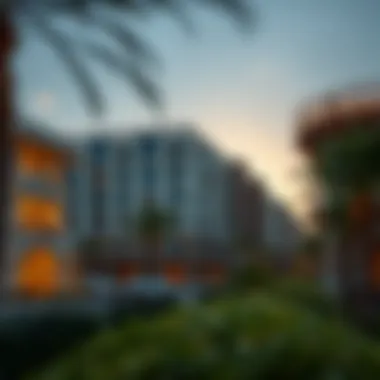UAE Real Estate Market Trends and Predictions for 2023


Intro
The UAE real estate market has long been a subject of fascination, a realm where ambition meets investment, and where the skyline of cities like Dubai and Abu Dhabi tells a story of progress and innovation. As we step into 2023, the market stands at a pivotal intersection, shaped by the aftershocks of recent economic upheavals and the optimistic whisper of recovery. For investors, homeowners, expatriates, and renters, understanding this landscape has never been more crucial. This article aims to peel back the layers of market trends, investment opportunities, and regulatory shifts that will define the year ahead.
"Navigating the real estate waters in the UAE requires not just insight but also a keen understanding of the winds of change that shape them."
Herein, we will explore vital themes that will impact the UAE real estate market moving forward. Expect to be equipped with a deeper understanding of current pricing trends, emerging neighborhoods, and the investment strategies that are gaining traction. Whether you're a first-time buyer looking for a cozy flat or a seasoned investor hunting for the next big opportunity, this guide is tailored to offer clarity and direction in a rapidly evolving environment.
Market Recovery Trends
The UAE real estate market has always been a dynamic terrain, showcasing its resilience in the face of economic challenges. As we navigate the scenarios presented in 2023, it becomes imperative to dissect the Market Recovery Trends that are shaping this vibrant landscape. Understanding these trends not only aids in evaluating the trajectory of the market but also allows stakeholders to adapt their strategies accordingly. Observing how properties rebound post- crises offers valuable insights into potential investment opportunities and identifies risks associated with volatility.
Post-Pandemic Recovery
The aftermath of the pandemic has thrown a spotlight on the UAE's ability to recover from economic setbacks. Post-pandemic, a noticeable uptick in demand for both residential and commercial properties has emerged. Many people who deferred their buying decisions during the height of restrictions are now back in the market. This renewed enthusiasm is underpinned by increased consumer confidence and a growing belief in the UAE's resilient economy.
Factors contributing to this recovery include:
- Government initiatives aimed at stimulating the economy, such as low-interest rates and supportive fiscal policies.
- An influx of expatriates returning to the UAE as travel restrictions ease, leading to a surge in the housing demand.
- Major events like the World Expo have continued to draw attention, further accelerating development in real estate.
In essence, the post-pandemic recovery is more than just bouncing back; it's about revitalizing a market that plays a pivotal role in the UAE’s economic framework.
Economic Indicators
To gauge the overall health and prognosis of the real estate market, one must look closely at key economic indicators. These figures provide a window into market dynamics, revealing trends that shape buyer and investor behavior.
Some critical indicators include:
- GDP Growth: The UAE continues to diversify its economy, which helps buffer against fluctuations in oil prices. A robust GDP growth can translate into increased buyer power and investment in real estate.
- Employment Rates: With job growth expanding, more individuals are entering the housing market, which is a solid sign of recovery. This dynamic fuels demand in both the rental and purchasing sectors.
- Interest Rates: The current low interest rates serve as a catalyst, making it an attractive time for homeowners and investors to secure favorable financing.
The confluence of these economic elements not only shapes the present landscape but also arms investors with critical knowledge for future endeavors.
In summary, understanding the economic indicators linked to the real estate market provides essential insight into its current state and future prospects. Stakeholders, whether they are buyers, sellers, or investors, need to keep a close eye on these figures as they navigate the complex terrain of 2023.
Investor Sentiment Analysis
Understanding investor sentiment is crucial for gauging the pulse of the UAE real estate market in 2023. It provides insights into how economic conditions, market trends, and personal perceptions of risk and reward intersect to influence purchasing behavior. Tracking investor sentiment can illuminate not just current buying patterns but also anticipate future shifts in demand. This section delves into the nuanced perceptions surrounding domestic versus foreign investment, and how shifts in risk appetite could redefine investment strategies.
Domestic versus Foreign Investment
The distinction between domestic and foreign investment in the UAE real estate market is underscored by contrasting motivations, regulatory environments, and awareness of local market dynamics.
- Domestic Investors: These buyers are typically more in tune with local market trends. They are often influenced by cultural factors and regional needs. Consequently, their purchasing decisions might heavily reflect personal or family considerations rather than solely financial imperatives. For instance, buying a home in Abu Dhabi or Dubai often carries personal significance, perhaps tied to cultural roots or aspirations for stable family life.
- Foreign Investors: On the flip side, foreign buyers often see the UAE real estate landscape as a lucrative opportunity. Strong infrastructure, a tax-friendly environment, and luxury living options attract them like bees to honey. Furthermore, the perception of safety and potential for high rental yields makes properties in cities like Dubai particularly popular among international investors. They might have different risk assessments based on their countries’ economic conditions—where instability at home could prompt a flight of capital toward more secure investments.
It's worth noting that the influx of foreign investments into the UAE can bolster market dynamics significantly. As the saying goes, “a rising tide lifts all boats,” and as these investors make their mark, it positively influences local communities and stimulates the economy.
Risk Appetite Shifts
Investor behavior is often reflective of their risk appetite, which inherently shifts depending on broader economic indicators and personal financial conditions. In 2023, the sentiment reflects a cautious optimism tempered by lingering effects of the pandemic.
- Increased Caution: Many buyers are weighing risks heavily, particularly in the wake of economic fluctuations. Factors such as inflation concerns, interest rate hikes, and global market volatility influence how individuals perceive real estate as an investment. Such factors might lead to a more cautious approach to property investment, wherein buyers are less inclined to make hasty decisions.
- Opportunistic Mindset: On the other hand, some investors view the current landscape as ripe for opportunity. With potential price adjustments and favorable transaction conditions, properties may be seen as undervalued. This subset of investors is willing to take calculated risks, anticipating returns that might outweigh short-term fluctuations.
“The best time to buy a property is when everyone is trying to sell; wisdom says you should be the one to seize the moment.”
This mindset encapsulates a growing trend among savvy investors looking to play the long game.
As the market evolves, understanding these shifts in investor sentiment will be paramount for stakeholders including real estate firms, buyers, and policymakers. The dynamics of demand and response reflect an intricate dance that can ultimately shape the real estate landscape in the UAE, making it a pivotal focus for those hoping to navigate this complex environment effectively.
For more details on investor activities and economic factors affecting the UAE market, feel free to engage with resources like Wikipedia, Britannica, or community discussions on platforms like Reddit or Facebook.
Key Market Drivers
The dynamics of the UAE real estate market are influenced by various key drivers that shape investment and development strategies. Understanding these drivers is critical for anyone looking to navigate the property landscape effectively in 2023. Each of these elements contributes to the overall health of the market and directly impacts buyer decisions, investor confidence, and long-term growth prospects.
Regulatory Changes


The regulatory framework is one of the most significant factors in the real estate market. Recent changes in ownership laws and property regulations have made the UAE more appealing to international investors. For instance, the introduction of long-term visas and the easing of certain restrictions allow foreign nationals to invest more freely in real estate.
"The UAE government has made strides in creating an investor-friendly environment, which could very well inspire a new wave of foreign capital into the market."
Moreover, initiatives aimed at protecting buyer rights and enhancing transparency help cultivate a stable market environment. Regulatory measures like these not only bolster investor confidence but also attract expatriates looking to make the UAE their home. By ensuring a cooperative regulatory landscape, the UAE positions itself as a top contender for real estate investment in a competitive global environment.
Infrastructure Development
Infrastructure development serves as the backbone of any vibrant real estate market. In the UAE, massive investments in infrastructure—such as roads, public transport, and smart city projects—substantially uplift property values. The expansion of the Dubai Metro and improvements in connectivity between cities, for example, make certain areas more desirable and accessible.
This push for enhanced infrastructure not only benefits residential developments but also boosts commercial real estate options. Increased accessibility leads to an influx of businesses and residents, driving up demand in areas surrounding major projects. As the government prioritizes infrastructure investment, prospective buyers should keep a keen eye on emerging hubs that promise high returns.
Expo Aftermath
The aftermath of Expo 2020 is another critical factor driving the real estate market in the UAE. The world fair, which showcased innovation and sustainability, has left a legacy of infrastructure and increased international exposure to the region. Post-Expo, the UAE has experienced a surge in tourism and a ripple effect on various sectors, including real estate.
In particular, properties near the Expo site in Dubai are witnessing a heightened demand as developers respond to growing interest. The event has catalyzed plans for urban development and spurred both luxury and affordable housing initiatives. Investors should monitor projects that aim to leverage this momentum, as they could offer substantial returns in an evolving market.
Residential Property Trends
The trends within the residential property sector are crucial for understanding the overall dynamics of the UAE real estate market. As diverse as the locales within the Emirates themselves, residential property trends shape the living experiences of expatriates, local residents, and investors alike. From opulent high-rises with views of the Dubai skyline to cozy villa communities in more serene areas, the choices are abundant. This section aims to delve deeper into two predominant themes affecting residential properties: the growing demand for luxury living and the necessary push for affordable housing initiatives.
Demand for Luxury Living
The thirst for luxury real estate in the UAE continues to quench the aspirations of many. The luxurious lifestyle that cities like Dubai and Abu Dhabi promise presents an appealing front to affluent buyers. Investing in residential properties like those at Palm Jumeirah or the Burj Khalifa area is almost akin to owning a slice of paradise adorned with top-tier amenities.
- High Net Worth Individuals (HNWIs) are increasingly setting their sights on premium properties, chasing prestige along with investment value. This drives prices up and invites a level of competition rarely seen in the conventional segments.
- Emerging luxury trends, such as bespoke interiors and unique architectural designs, are captivating buyers. People are not merely seeking a house; they are looking for homes that reflect their personalities and statuses.
However, this demand for luxury living does come with a caveat. Many of these high-end properties attract scrutiny regarding sustainability practices and energy efficiency, which are becoming significant considerations among discerning buyers. Ultimately, balancing elegance with environment-conscious amenities is increasingly important.
"Luxury is not just about the home; it's about the lifestyle that surrounds it."
Affordable Housing Initiatives
On the flip side, the talk around affordable housing can't be ignored. Amid increasing costs in metropolitan areas, the government initiatives lean towards creating accessible housing options that cater to the middle-income expat community and local families struggling with the escalating living expenses.
- Legislative approaches play a pivotal role. Recent laws have added incentives for developers to incorporate affordable units into their projects. This is not merely charity; it allows for a balanced real estate sector where diverse demographics can coexist rather than all reside in the upper echelon of housing.
- Public-Private Partnerships (PPPs) are increasingly becoming a method of creating economically viable housing solutions. For example, partnerships between developers and government bodies result in projects designed explicitly for budget-conscious buyers.
While the desire for affordable housing may seem to contradict the allure of luxury living, the truth is that both segments can exist harmoniously. The rising demand for budget-friendly housing creates opportunities for investors who can navigate this intricate landscape and target multifaceted investments.
To sum up, the residential property market in the UAE is a mosaic made up of varying desires and demands. It reflects a mixture of opulence and accessibility that appeals to a wide range of potential buyers—both for those seeking a lavish lifestyle and for families who wish to secure affordable homes.
For more insights into the UAE housing market, consider visiting UAE Real Estate Info and Dubai Land Department. The continual interplay between these trends will likely define the residential landscape in the years to come.
Commercial Real Estate Insights
The commercial real estate sector in the UAE is a critical part of the overall market landscape. As the country positions itself as a global hub for business and tourism, understanding the nuances within this segment is paramount for investors, developers, and stakeholders alike. The insights into office spaces and retail developments are not merely academic; they provide a framework for making informed investment decisions and strategic planning.
The importance of analyzing commercial real estate trends stems from various factors:
- Economic Growth: Commercial properties directly correlate with economic activity. A growing economy fosters demand for office spaces and retail outlets, while a slowdown might affect vacancy rates.
- Diverse Investment Opportunities: The UAE's multi-faceted economy offers various commercial property types, including office buildings, shopping malls, and mixed-use developments. Each type presents unique risk and return profiles.
- Regulatory Impact: Government policies and regulations specifically aimed at commercial real estate can influence market dynamics, affecting everything from property valuation to transaction processes. A deep dive into these aspects can reveal hidden opportunities or potential pitfalls.
In this section, we will elaborate on two significant components: the trends in office spaces and developments in the retail sector.
Office Space Trends
The landscape of office spaces in the UAE is evolving, driven by remote working habits and technological advancements. The traditional notion of what an office looks like is changing rapidly. As businesses reconsider their operational models post-pandemic, companies are expressing diverse needs.
- Flexible Workspaces: The rise of co-working environments reflects a shift towards flexibility. Businesses are increasingly opting for short-term leases in co-working spaces like WeWork and Spaces. This trend allows companies to scale operations up or down without the long-term commitment associated with traditional office leases.
- Hybrid Models: Many corporations are adopting hybrid work models, blending remote and in-office work. This shift has led to a reallocating of square footage per employee, with a possible decline in overall office demand, but an increase in meeting rooms and collaborative spaces. Developers responding to this change might focus on creating functional, adaptable spaces.
- Sustainability: There's a noteworthy shift towards greener office buildings. More companies are seeking environmentally friendly leases, thus prompting developers to invest in sustainable designs. LEED certification and building energy efficiency become essential factors for landlords and tenants.
Each of these trends underscores the importance of staying agile and responsive in the office market, ensuring that investments align with current and future demands.
Retail Sector Developments
The retail sector in the UAE possesses a dynamic quality, influenced heavily by cultural trends, tourism, and e-commerce. Retailers must figure out how to attract consumers who are becoming increasingly digital savvy.


- E-commerce Integration: COVID-19 accelerated e-commerce adoption, leading brick-and-mortar stores to integrate digital strategies. Companies like Majid Al Futtaim are investing in omnichannel systems, allowing consumers to shop either in-store or online seamlessly.
- Experiential Retail: Innovation is key in keeping foot traffic alive. Retailers are shifting focus towards creating unique customer experiences rather than just providing products. Malls now house entertainment options like VR games, immersive dining, and live events that engage shoppers beyond traditional browsing.
- Location, Location, Location: Prime locations continue to captivate both local and international retailers. Spaces close to tourist attractions or busy expat communities, such as those found in Dubai Marina or Abu Dhabi’s Corniche, are seeing higher demand and premium rental prices.
The retail sector's adaptation to the market changes, highlighted by these developments, showcases how businesses are evolving to meet new consumer behaviors and preferences.
Impact of Technology on Real Estate
The integration of technology in the real estate sector is not just a passing trend; it has become a driving force shaping how buyers, sellers, and investors engage with the market. In the UAE, this technological influx is particularly significant as it brings efficiencies, transparency, and innovative solutions to traditional practices. From property management to customer engagements, technology is redefining the landscape, allowing stakeholders to make better-informed decisions. Here are some key elements that highlight the importance of technology in the real estate sector:
- Enhanced Data Analytics: The ability to analyze vast amounts of data allows for more informed decision-making. Investors can assess property values, trends, and neighborhood dynamics with greater accuracy.
- Improved Marketing Strategies: Technology enables realtors to market properties more effectively, employing targeted advertising tools and social media platforms to reach potential buyers.
- Streamlined Operations: Automation and software solutions improve operational efficiencies, reducing the time and cost associated with property management.
Understanding these dynamics not only helps in navigating the current market but also in anticipating future trends.
PropTech Innovations
Innovation in property technology or PropTech is transforming how real estate transactions are conducted. Emerging tools and platforms are simplifying processes that once seemed daunting. One major advantage is the capability for real-time data access and instant communication.
Examples of notable PropTech innovations include:
- AI-driven analytics tools: These aid in predicting market trends by analyzing historical sales data and buyer behavior patterns.
- Blockchain technology: Used for secure transactions, ensuring transparency, and reducing fraud in property deals.
- Smart contracts: Automate contractual agreements, making transactions smoother and more reliable.
By embracing these innovations, investors and homeowners can significantly reduce their risk and increase the effectiveness of their strategies.
Virtual Tours and Remote Transactions
With the rise of technology, virtual real estate tours and remote transactions are gaining prominence, particularly following the global pandemic that necessitated alternative viewing options. This trend is particularly appealing for international buyers who may not have the opportunity to visit properties in person. Virtual tours offer a comprehensive view of properties, allowing clients to explore homes from the comfort of their own living rooms.
Some key benefits of virtual tours include:
- Convenience: Buyers can view multiple properties without traveling.
- Time-saving: Agents save time by filtering out non-interesting properties before in-person visits.
- Enhanced Accessibility: Remote transactions mean that buyers can finalize deals without being physically present.
"Virtual viewing technology not only meets today’s demand for convenience but is likely a standard for future sales."
As this trend continues to grow, it encourages a shift towards more digital-first strategies in real estate operations, proving invaluable amid an ever-evolving market landscape.
Sustainability Trends
The UAE real estate market increasingly recognizes the significance of sustainability trends. As the region faces environmental challenges and a growing population, the demand for green solutions in property development becomes unavoidable. Sustainability not only benefits the environment but also enhances property values and attracts discerning investors. With international focus on climate action, aligning with sustainable practices has become imperative for developers and real estate stakeholders.
Green Building Initiatives
Recent years have seen a surge in green building initiatives across the UAE. Developers are keen on employing sustainable practices which not only resonate with global environmental standards but also appeal to modern buyers. The UAE Government has set ambitious goals for green buildings, aiming for 30% of the country’s buildings to adhere to green standards by the year 2030.
Key practices embraced in these initiatives include:
- Energy Efficiency: Utilizing renewable energy sources such as solar panels, which reduces dependency on fossil fuels while significantly cutting energy costs.
- Water Conservation Techniques: Incorporating water-efficient fixtures and rainwater harvesting systems to minimize usage and promote sustainability.
- Sustainable Materials: Sourcing locally-produced, recyclable materials that reduce the carbon footprint associated with transportation.
These proactive measures create pleasant living environments, attract eco-conscious residents, and offer lower operational costs, making properties more appealing to buyers.
Eco-Friendly Developments
Eco-friendly developments are reshaping the landscapes of major cities in the UAE. New projects are not only aesthetically pleasing but also promote a sustainable lifestyle. From parks integrated with nature to communities that prioritize walkability, the emphasis is on creating harmonious living spaces that support ecological balance.
Some notable aspects of these developments include:
- Integrated Green Spaces: Developers are increasingly incorporating parks and green roofs, enhancing biodiversity and providing residents with recreational spaces.
- Smart Technology: The integration of smart home technologies contributes to energy conservation. Systems like automated lighting and climate control efficiently manage resources.
- Community Engagement: Building eco-friendly developments is also about fostering communities that advocate for sustainability. Developers often include workshops and events aimed at educating residents about eco-friendly practices.
In an era where every action matters, these eco-friendly advancements showcase how the real estate sector can lead by example in fostering greener cities.
The cumulative effect of these initiatives and developments paves the way forward for a sustainable UAE real estate market, promising not just enhancement in property values but also an overall improvement in quality of life. Investors and homebuyers are increasingly seeking out these eco-conscious options, reflecting a shift in market demand. By investing in sustainable properties, stakeholders contribute to a better future for the community and the environment alike.
International Investment Perspectives
Understanding the international investment landscape is pivotal in the context of the UAE real estate market. The Emirates has positioned itself as a vital hub for global finance and culture, drawing in investors from all corners of the world. This section delves into the key elements and benefits of engaging with this market, shedding light on why it holds considerable allure for various stakeholders.
Emerging Markets Interest


For many investors, the UAE is not just another destination; it represents an opportunity tinged with promise. Countries in the Middle East have become emerging markets that attract a wealth of international interest. The rapid urbanization and the boom in developments in cities like Dubai and Abu Dhabi paint a picture of growth that excites investors looking for long-term gains.
Various factors contribute to this interest:
- Diversification of portfolios: Investors see the UAE as a gateway to diversify their portfolios, spreading out risks in volatile markets elsewhere.
- High Return on Investment (ROI): The rental yields in various neighborhoods often exceed those in more mature markets, presenting opportunities for higher earnings.
- Market Stability: The UAE's economic governance promotes a stable environment, backed by strong institutions and forward-thinking policies, making it an attractive locale for foreign capital.
However, investors must navigate the unique challenges of this thriving market. Understanding local laws, cultural nuances, and regional dynamics becomes vital for successful investment.
Global Economic Factors
The global economy plays a crucial role in shaping investment strategies in the UAE real estate sector. A multitude of influences can steer market dynamics:
- Interest Rates and Inflation: Fluctuations in these factors globally can directly impact investors' access to financing, thereby influencing property prices and rental markets within the UAE.
- Geopolitical Stability: The UAE's strategic location has historically buffered it against regional turmoil. Global stability enhances investor confidence, leading to increased interest and further entrenchment in the market.
- Foreign Exchange Rates: As a significant portion of the real estate investment funnel comes from foreign currencies, the effectiveness of currency exchange rates can greatly impact purchasing power. Investors from regions experiencing currency depreciation may find it less feasible to engage in the local property market.
"Investment in real estate is not just about financial outputs; it’s about understanding the interplay of diverse elements disrupting and shaping the market landscape."
For more information on the UAE's economic position, visit UAE Economic Overview.
As we move forward, understanding these perspectives deepens the knowledge base needed to make informed decisions in a market that continually evolves.
Regulatory Landscape
The regulatory landscape in the UAE real estate market plays a pivotal role in shaping investment decisions, promoting investor confidence, and ensuring the orderly development of properties. The importance of understanding the various regulations cannot be overstated, as they inform stakeholders about the legal framework governing property transactions. Regulations help in mitigating risks associated with real estate investments, and their structure is designed to encourage foreign investments while protecting local interests.
Ownership Laws
Ownership laws in the UAE establish the legal prerequisites for property acquisition, determining who can own what and under which conditions. The law varies significantly between Emirates, making it essential for prospective investors to grasp the nuances in the legal system.
- Freehold and Leasehold Options: In certain zones, non-UAE nationals have access to freehold properties, which grant full ownership rights. In contrast, leasehold arrangements restrict ownership duration, typically to 99 years.
- Long-term Residency Benefits: As part of attracting foreign investment, changes to laws have introduced long-term residency permits. For instance, owning property worth a specified amount can lead to residency visas, further enticing expatriates and international buyers.
Through these regulations, the government is not merely facilitating transactions; it's crafting an environment where global investors feel welcomed yet protected.
Investment Incentives
Investment incentives within the real estate arena serve to further bolster interest and participation from both domestic and international players. The UAE government has introduced various comprehensive measures to create an attractive investment climate, especially noteworthy in a landscape that thrives on confidence and stability.
- Tax-Free Environment: The absence of property taxes and capital gains taxes remains a notable advantage, positioning the UAE as a prime location for property investment. This ensures investors can get maximum returns without unnecessary deductions.
- Access to Financing: Recent reforms have facilitated easier access to financing for both foreign and local investors. By encouraging banks to offer financing products with variable interest rates, the market has seen a surge in buyer participation.
- Streamlined Processes: The Real Estate Regulatory Agency (RERA) continues to simplify the buying and selling processes, reducing bureaucratic hurdles and allowing transactions to flow more smoothly.
"Understanding the regulatory framework is crucial for anyone looking to invest in the UAE real estate market. It serves as a guide not only for navigating ownership but also for maximizing returns on investment."
Overall, navigating this regulatory landscape requires close attention to details, but it certainly offers a plethora of opportunities. Whether one is an investor from overseas or a local looking to expand their portfolio, being well-versed in the laws and incentives can present considerable advantages.
Future Outlook
The future of the UAE real estate market presents a landscape that is both promising and multifaceted. Understanding the expected trajectories is crucial for stakeholders, be they investors, realtors, or individual homeowners. The importance of the future outlook cannot be overstated, as it provides a compass to navigate a market full of speculation and opportunities.
Several elements have a hand in shaping this outlook, including the resilience demonstrated post-pandemic, shifts in investor preferences, and the adaptability of the market to technological advancements. Tuning into these factors helps in assessing potential returns and making informed choices.
Key benefits of focusing on the future outlook include:
- Informed decision-making: A clear perspective leads to better strategies, whether buying, selling, or investing.
- Risk management: Understanding future trends aids in identifying potential risks and opportunities, allowing for timely action.
- Capitalizing on growth sectors: An outlook can reveal burgeoning segments of the market ripe for investment.
As we explore the specifics in the following sections, investors will glean insights into price forecasts and long-term growth predictions, essential tools for systematically engaging with this ever-evolving market.
Price Forecasts
Turning our attention to price forecasts, it’s essential to connect pricing dynamics with current economic factors. Experts suggest that as the market stabilizes post-recovery, property prices in the UAE are likely to reflect a moderate upward trajectory. Factors driving this forecast include:
- Increased demand: With UAE's steady influx of expatriates and continuous local buyer interest, demand is set to push prices higher.
- Economic growth: The UAE's economy seems to bounce back with vigor, leading to enhanced purchasing power.
- Interest rates: As global monetary policies shift, local interest rates may find themselves in a range that encourages borrowing, consequently affecting property prices.
By 2023, buyers could expect smart investments in urban locales paired with luxury segments to yield lucrative returns. In simple terms, property prices are projected to reflect a careful balance of demand against supply.
Long-term Growth Predictions
When considering long-term growth, the UAE real estate market stands out for its potential resilience. A key takeaway for investors is that the UAE's strategic location, robust infrastructure, and government policies conducive to foreign investment fuel optimism for sustained growth. Some predictive highlights include:
- Ongoing infrastructure developments: Projects like the expansion of public transport systems and new commercial hubs will only further increase property value.
- Sustainability initiatives: With the global shift towards eco-friendly living spaces, properties designed with sustainability in mind are likely to see appreciation in value.
- Sector diversification: Beyond traditional residential or commercial properties, sectors like tourism and hospitality appear set to bloom, expanding growth avenues.
"The future is not something we enter. The future is something we create." - Leonard I. Sweet
For additional information on market conditions, you can check resources such as Wikipedia or Britannica to get a broader context on real estate trends and their impacts.



